March/April 2018
Happy Spring! Program Manager, Michelle Spada, and Executive Director, Jodianna Ringel, have just returned to Princeton from visiting 14 current and new host organizations in 7 different countries. A highlight of these trips was the Fellows’ Leadership Retreat, once again held in Moshi, Tanzania. All 48 current Fellows were able to attend this year, in addition to four alumni coordinators, who came from Tanzania, Uganda, Malawi and New York to share advice and offer support to the Fellows.
We hope you enjoy reading what some of the Fellows have been up to in this month’s edition of the Fellows Flyer.
PiAf Connections
Please click below to check out pictures of our Fellows, Alums and other members of the PiAf family meeting up at home and around Africa.
Notes from the Field
By Loriade Akin-Olugbade, 2017-18 Fellow with Population Services International West and Central Africa in Senegal
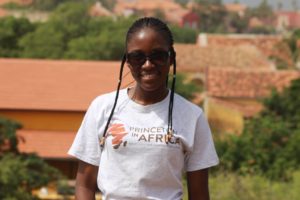
Loriade on Goree Island, Senegal
“I am convinced that the Princeton in Africa Fellowship will enable me to create the solid foundation for a long and successful career. I look forward to learning and transforming into a skilled researcher, influential partner to change makers and policy makers, and knowledgeable professional. I am particularly enthusiastic about expanding my network of individuals equally passionate about Africa with whom I will work to make a difference on the continent.”
The paragraph above was part of my answer to a question in the Princeton in Africa Fellowship application I submitted in late 2016. Today, about six months after I joined PSI’s West and Central Africa (WCA) Regional Team in Dakar as a Princeton in Africa Fellow, I can say that some of these things are already true.
Since I work at the regional level, I support members of the research, monitoring and evaluation teams in the 10 countries of the WCA region at PSI. In so doing I contribute to tasks related to projects or studies on HIV, water and sanitation, family planning, or child health. My role involves writing or editing reports, advocacy briefs, presentations and other documents in both French and English. It also entails translating documents, developing data collection forms on DHIS2, and checking the quality and accuracy of data collected in the field. I also had the privilege of joining the early stages of a study on the behavior, attitudes and practices of key populations at risk of HIV infection in Conakry (Guinea) earlier in my fellowship. Then, I participated in final reviews of the protocol and methodology and the training of data collectors besides editing the manual and some questionnaires data collectors used in the field. At the moment I help my supervisor fill in the role of Regional Researcher which has been vacant since December.
I have also expanded my “network of individuals equally passionate about Africa” since I became a Fellow. Aside from my supervisor, coworkers, and the PiAf team, my fellowship class includes talented, driven, and inspiring young professionals who want to create change. I have also interacted – online and in person – with alums whose experiences have helped me make sense of mine and start thinking about the future. In Dakar, besides Senegalese people, I have met young Africans who are also gaining work experience outside their country of citizenship and/or the country their family comes from. They are creative, passionate and want to leave their mark. When we’re not pursuing common interests in travel and photography, we motivate each other to fearlessly pursue our dreams of making a difference in Africa.
Excluding a few challenges, the last six months have been an incredible experience and I am happy that I applied to Princeton in Africa. Although I’m not a fortune teller, I have a feeling this year is indeed helping me create a solid foundation for a long and successful career.
Notes from the Field
By Brandon Conner, 2017-18 Fellow with Legal Resources Centre in South Africa

Brandon with advocate George Bizos for his 90th birthday
Lunch is an important time at the Legal Resources Centre (LRC). Every day, most members of the LRC emerge from their respective offices and we gather together in the kitchen to eat lunch. Lunch serves as a time to receive suggestions and inputs from coworkers on projects that we are working on, discuss current events and case strategy, and to share a few laughs over memes. One important aspect of LRC lunchtime is the presence of Advocate George Bizos S.C or as the office affectionately calls him “Uncle George.”
Uncle George is a seminal figure in South African history. He was part of the defense team for Nelson Mandela, Walter Sisulu, and other leading anti-apartheid leaders during the Rivonia trial. He was involved in the inquest concerning the deaths in detention of Black Consciousness Leader Steve Biko and trade unionists such as Dr. Neil Aggett. He was involved in the Truth and Reconciliation process in which he represented victims and families of victims of the Apartheid regime in refuting the claims of amnesty by their perpetrators. He was instrumental in the drafting process for the new democratic Constitution of South Africa and led the legal team to argue its certification in the Constitutional Court.
Every day, Uncle George recounts stories from his legal and personal past. They are informative in the sense that they provide an amazing opportunity to hear firsthand accounts of seminal moments in South African History. However, they are also didactic and are given in response to a comment or question posed by a coworker. He also always intertwines these stories with recitations of ancient Greek comedies and tragedies to further illustrate the points that he is trying to make.
These stories always add a depth to the conversation happening at lunch and provide jumping off points for further conversation. For me, they’ve also served as a crash course in South African history and the continued connections between its past and its present. They, along with the responses of my coworkers, have also served to illustrate the role that the LRC has played in the South African struggle for liberation and continued role that the LRC can play in ensuring that all South Africans, especially those that are marginalized by society, can have access to the civil, political, and socio-economic rights enshrined in the new democratic Constitution.
Notes from the Field
By Isaiah Sciford, 2017-18 Fellow with International Rescue Committee in Kenya

Isaiah and coworkers smile like the bus for team building didn’t leave 3 hours late
Kibera is the largest informal settlement in urban Africa. It’s also five minutes from the semi-permanent pop-up brunch restaurant I ate at last weekend. Eastleigh has been on the State Department’s list of travel restrictions for the greater part of the twenty-first century (though recently downgraded to the much more reasonable “reconsider travel at all times” under the new classification). It’s also within ten minutes of where I watched Forest Whitaker strip away the power of the Black Panther.
Well yes – fair point – urban poverty is nothing new (and neither is juxtaposing it next to an anecdotal example of wealth, millienialism, or what I do on my weekends), but for all of the shout outs you’ve heard/made to Africa’s starving offspring, there really isn’t any real or widespread understanding of the cultural, institutional, and political realities that prevent people from generating income and assets. I certainly didn’t understand the nuances of it before moving to Nairobi last year.
One of the greatest learning opportunities from my time with the International Rescue Committee comes from working closely with the IRC’s urban livelihoods initiative here in Nairobi that applies to urban refugees and vulnerable Kenyans alike. You see, refugee programming has historically had a camp-based bias which can unintentionally crop urban refugees with at least as much need out of the (funding) picture. As humanitarian programming has rightfully grown to support camp adjacent host communities in recent years, this bias now applies in parallel to the disadvantaging of vulnerable urban Kenyans.
The root of refugee poverty in Nairobi (he says audaciously) is not that a refugee can’t start a business because they’re a refugee. The problem is that because they’re a refugee, they lack formal access and protections needed to attain favorable lending rates/capital support, move about freely to conduct business without fear of intimidation, and/or gain admission to requisite skills training and educational opportunities. The same can be said for vulnerable Kenyans. And the same is certainly true for youth from both groups who bear the dual brunt of historical poverty and the intergenerational blame game.
Through the Building Incomes and Leveraging Livelihoods for Youth (BILLY) project, the IRC is taking a particularly robust approach to, well, building incomes and leveraging livelihoods for youth in Nairobi. Rather than focusing on only one piece of the refugee-programming pie, BILLY is working the long-term goal of reforming law, society, and attitudes to support Kenya’s most vulnerable and at the same time empowering clients with a bundled service approach that includes vocational training, apprenticeships, and entrepreneurship support. It is engaging private sector partners, public sector stakeholders, and individual client voices. It is considering the informal and the formal and measuring the space between. I’m just honored and excited to be a part, albeit a small and temporary one, of a truly comprehensive piece of work and to know that my work is, in its own small way, expanding the narrative of urban poverty (and you can too for less than the cost of a cup of coffee each day…).
Notes from the Field
By Samantha Mendoza, 2017-18 Fellow with Indigenous Education Foundation of Tanzania
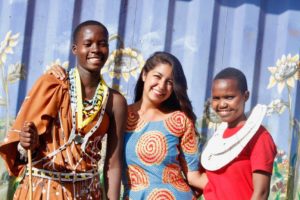
Samantha joins some of her students at an end-of-year celebration at Orkeeswa
As an aspiring international journalist who strives to contribute ethical and balanced reporting that contributes to a greater understanding of the African continent, I have spent years questioning whether or not I would ever find an international NGO that I believe operates ethically and efficiently. As a Princeton in Africa fellow at the Indigenous Education Foundation of Tanzania, I may have found my answer.
IEFT operates the Orkeeswa School in Monduli, Tanzania: a co-ed, community-collaborative secondary school founded in 2008. The organization provides affordable, holistic education to an under-served Maasai community that has graduation rates of less than 1 percent and one of the highest child marriage prevalence rates in the world. IEFT works directly with community leaders and parents to develop strategic goals for the organization. It provides a safe space for students to question and critically analyze issues they identify in their communities. And most importantly, it recognizes, nurtures and harnesses the potential of young girls so that they can express their goals and dreams while remaining proud and deeply invested in the preservation of their culture.
As girls at Orkeeswa conduct science experiments, coach basketball at neighboring primary schools, start small businesses, write original screenplays, perform in school dramas, create art projects and learn photography, they grow and develop as scholars and leaders in their communities. They pursue interests and passions that they may not have otherwise had access to. And with each achievement, each three-pointer on the basketball court or high mark on an exam, these students challenge the community’s perception of what girls can and should accomplish.
As IEFT’s communications fellow, it is my job to share our students’ stories with the world, amplifying their voices for a global audience. I interview young women about what it’s like to be the first person in their families to complete primary school. I have conversations with aspiring doctors and future presidents. And I photograph students who are mentoring young girls in their community so that they, too, can defy statistics and continue their education past 6th grade.
I recognize that social transformation does not happen overnight, or within the span of a one-year fellowship. But it does begin when a young Maasai girl becomes the student body president of her school. It continues when a small group of students write, direct and produce an original short film about early marriage, and use it to facilitate dialogues with community leaders by hosting screenings around their villages. It continues still when girls write original screenplays in their Screenwriting Club about the effects of gender discrimination. And gradually, paragraph by paragraph, the stories communities tell themselves about women and girls get re-written.
Having the privilege to learn from these incredible young role models has reminded me of just how important it is to listen rather than speak, and has made me even more committed to pursuing a career that provides a platform for young women around the world to share their voices and be heard.
Notes from the Field
By Stephanie Dowling, 2017-18 Fellow with Clinton Health Access Initiative in Swaziland
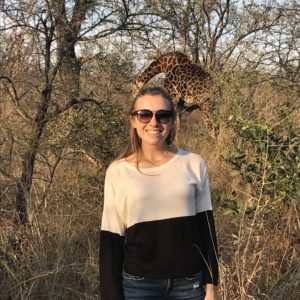
Stephanie visiting the Mbuluzi Game Reserve
Globally, government decisions about the allocation of public funding within limited resource settings must balance competing public priorities with financial sustainability. Within the health sector, it is difficult to anticipate the actual return on investments, especially given that many elements impact health throughout an individual’s life. My role on the health financing team at CHAI has given me the opportunity to analyze how to ensure that these funds are used efficiently within the health system.
My time in Swaziland has exposed me to complex dynamics related to resource prioritization and allocation. When thinking about the design and rationale for a particular health intervention, I learned the critical importance of assessing factors that influence historical budgeting and spending. Additionally, it is important to develop analytical scenarios to guide resource allocation within varying levels of funding constraints.
I have learned that advocacy and decision-making related to budgeting cannot be thought of in isolation from cost effectiveness. I conceptualize cost effectiveness in two main ways: determining what financial investments can have the broadest impact, and identifying ways to streamline processes that guide the supply of health services. How can we efficiently utilize existing and available resources to provide optimal services to the greatest number of people?
One way my team works to maximize impact within resource constraints is by advocating for increased funding for certain key consumables, drugs, or tests that will enable health workers to provide an array of quality health services. For example, while providing strategic guidance to scale up tertiary services, I began to think through questions including: Are there specific bottlenecks in the supply chain that impede regular and timely drug delivery to health facilities, leading to underutilization and expiry of drug stock? How can this inform drug quantification estimates?
My team also explores different strategies to make supply chain or patient referral processes more efficient and cost effective. Specifically, I am building a database that tracks and manages patients referred for tertiary care throughout the care continuum. Strengthening patient tracking capabilities can ensure that local facilities are operating at optimal capacity before the country needs to refer patients to receive care internationally.
It is important to think critically about how our analytical work can both inform and effectively respond to realities on the ground. For example, even if a facility receives funding to scale up a particular service, this funding may need to be re-programmed to address other patient priorities or emergencies. Thus, sustainable health financing is contingent on designing programs that equip facilities with the tools to respond to both anticipated and unanticipated circumstances. I value my role at CHAI Swaziland because it encourages me to innovatively approach and advocate for optimal resource allocation.
Notes from the Field
By Udita Persaud, 2017-18 Fellow with Baylor Pediatric AIDS Initiative, Tanzania
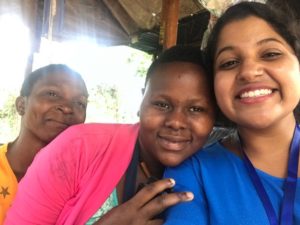
One of the famous selfies with Udida’a dear friend, Constancia (middle) and one of her family members (left).
“Ah Udita, let us take a selfie!” exclaims Constancia, who is the daughter of one of the Mamas who own a chakula (food in Kiswahili) stand near my home. I pass and talk to Constancia and her mother almost every day to and from work. They never fail to put a smile on my face and get me to laugh, even on the worst of days. Some days after work—especially the hard days when I have to witness and internalize the realities of pediatric HIV in Tanzania— it is a mental struggle to walk home. However, once I see Constancia and her mother on my way home, I am instantly grateful that I chose to make the little trek home on foot. They never fail to chat with me and offer me food from the day. We somehow meet each other in the middle with my limited Kiswahili and their limited English, which is definitely comical but some of my most cherished experiences! They have become a big part of my daily life in Mwanza.
I often hear other NGO workers and ex-patriates discuss how Tanzania can be a difficult place to befriend local Tanzanians. To be honest, I went through a period during the beginning of my fellowship year of believing this to be true. It is extremely difficult to move to another county with different cultural norms and languages from your own. I often found myself around extremely friendly people but not able to bridge myself into a “meaningful friendship” with them. I became frustrated at my inability to have deep and meaningful conversations that I am used to having with others because of the barriers that were present—the first one being language.
However, as my time here has progressed, I realize that maybe my definition of a “meaningful friendship” might be at fault. I may not be able to discuss the topics that I am used to chatting with my friends back home, but my cheerful banter with Constancia; playtime with my compound cat Moshi and my guard Eddy; exuberant laughter and teasing with Evelyn who sells the best mangoes; and warm hugs with the owner of my favorite local restaurant fill me up almost every day. And I definitely have gotten those deep and meaningful conversations with other local Tanzanian friends, but that doesn’t mean that my interactions with my other friends, where the language barrier might be more significant, are less meaningful. My warm and comical interactions with Constancia and her family will be the ones I miss the most when I leave Mwanza. These little every day conversations and interactions can be some of the most meaningful parts of a friendship, and I am so happy I didn’t close myself off to them.
Notes from the Field
By Zach Manta, 2017-18 Fellow with The Kasiisi Project in Uganda
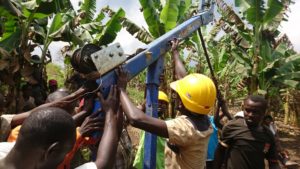
Vincent and the other men on the Village Drill team assemble the frame of the drill, used to create a groundwater well for the Nyabweya Primary School.
On a Wednesday afternoon in late November, I find myself in a Ugandan primary school standing before some fifty students and giving a lecture on climate change. The situation screams irony. Many of my young audience members may not be responsible throughout their entire lives for as much accumulated carbon output as the plane I flew into the country on. Compared to me, they will almost certainly face more severe consequences from this environmental catastrophe – one which is already reshuffling the region’s seasonal rains and spelling out uncertainty for crop yields.
My answer to this conundrum is simple; I stick to the PowerPoint slides my supervisor has prepared, and when it comes to the infographic comparing the average carbon emissions of North Americans and Africans, pantomime guilt for some cheap laughs. In order to end on a high note, the slides conclude with a triumphant path forward: “Local solutions to global problems!”
The “local solutions” creed was repeated in my university’s environmental studies curriculum ad nauseam. Even then I always thought it seemed unsatisfying; little more than a bone to throw anxious students of a younger generation to cover for the fact that global solutions aren’t likely to come through any time soon. As I stand in the front of the classroom and parrot the same doctrine, my cynicism for it hardens.
—
On a Monday morning in January, I sit on the ground and watch a man named Vincent carry out the final steps to install a groundwater well that he and his coworkers have been constructing for the past week. Being appointed to supervise the well construction has been one of the highlights of my fellowship with The Kasiisi Project, in part because it gave me the privilege of watching Vincent and the other engineers at work. Most Ugandans I know are astonishingly resourceful and handy by American standards, but Vincent takes it to the next level. When he needs heat to soften the bottom section of the well casing, he strikes a match and lights up some dried banana leaves. To make a connection between two pipes temporarily watertight, he grabs a plastic bag off the ground and binds it in place with a rubber strap. When our generator suddenly stops producing current – well I’ll be damned, he’s an electrician, too!From my four years of environmental studies courses, one of the few readings I go back to is Michael Pollan’s 2008 article “Why Bother?” from the NYT Magazine. Pollan proposes that one reason Americans feel so helplessly distraught in the face of climate change is that we’ve grown accustomed to outsourcing all of our problems to faraway specialists and global markets, so global solutions are the only kind of answers we can imagine making a difference. As I sit and watch Vincent, the king of all generalists, insource local solutions from the trash around him, the global problem of water access doesn’t seem so impossible. My cynicism softens again, and something inside me calms down.





